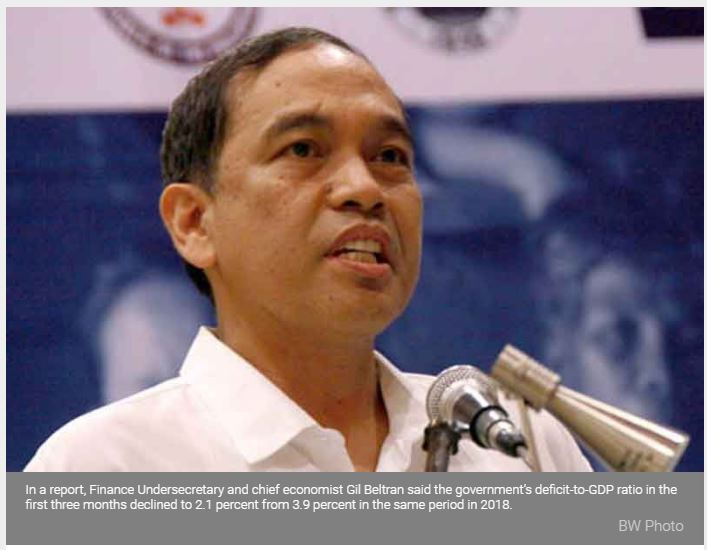Philippines: Deficit-to-GDP ratio eases to 2.1% in Q1
MANILA, Philippines — The national government’s fiscal deficit as a share of the country’s gross domestic product (GDP) narrowed in the first quarter as expenditure effort declined due to the delay in the 2019 budget, according to the Department of Finance (DOF).
In a report, Finance Undersecretary and chief economist Gil Beltran said the government’s deficit-to-GDP ratio in the first three months declined to 2.1 percent from 3.9 percent in the same period in 2018.
Beltran attributed this to the slowdown in expenditure growth, which was brought about by the delay in the passage of the 2019 General Appropriations Act (GAA).
“The moderated growth in expenditures led to a lower national government deficit, which settled at 2.1 percent of GDP,” he said.
In the first quarter, government disbursements rose by only 0.8 percent year-on-year to reach P778 billion. Revenues, for its part, grew by 11 percent to P687.7 billion, outpacing the growth in disbursements.
As a result, fiscal deficit narrowed to P90.2 billion compared to the P152.2 billion deficit recorded in the same quarter of 2018.
Economic managers have capped the government’s deficit ceiling at 3.2 percent of GDP for full year 2019, higher than last year’s ceiling of three percent.
Meanwhile, the economy grew at a rate of 5.6 percent during the same period, slower than the 6.3 percent recorded in the previous quarter, and the 6.5 percent posted in the first quarter of 2018. This is likewise the slowest growth recorded in four years.
According to Beltran, the delay in the 2019 budget resulted in lower expenditure effort for the January to March period, which settled at 18.5 percent. This was 1.2 percentage point down from the 19.7 percent posted last year.
On the other hand, the DOF’s chief economist said the government’s revenue effort in the first quarter increased by 0.5 percentage point to 16.3 percent from last year’s level of 15.8 percent.
Tax effort, in particular, climbed by 0.3 percentage point to 14.6 percent from 14.3 percent in the same period last year.
Beltran said this happened as both the Bureau of Internal Revenue (BIR) and Bureau of Customs (BOC), two of the largest revenue generating agencies, registered improvements in their collections during the period, resulting in combined tax revenues of P615.8 billion, 10.2 percent up from P558.7 billion in the same quarter of 2018.
Beltran attributed the increase in tax collections to the second phase of the Tax Reform for Acceleration and Inclusion (TRAIN) Law, as well as the continued tax administration reforms.
The 2019 budget was only signed by President Duterte last April after months of deadlock in the Congress. This forced the government to operate on a reenacted budget in the first quarter of the year.
According to Beltran, the budget delay resulted in underspending amounting to P69.5 billion in the first quarter, which dragged down economic growth.
Source: https://www.philstar.com/business/2019/05/16/1918082/deficit-gdp-ratio-eases-21-q1#12j3ECU0rEeBIfgJ.99


 English
English




